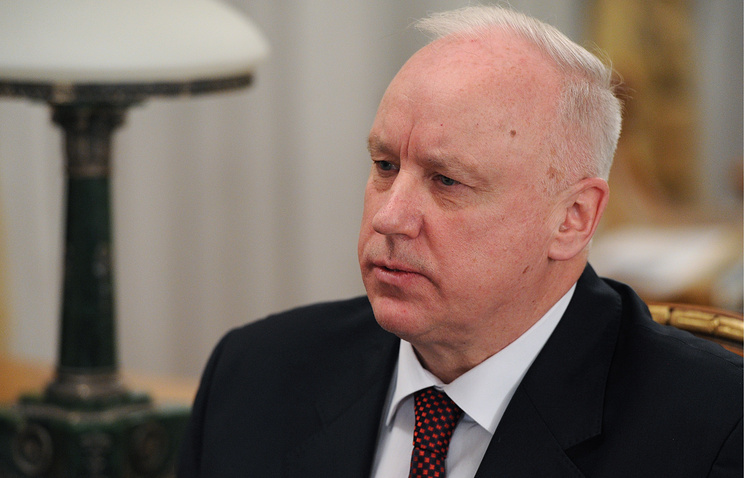This Monday, the 24th of July, one day before Russian investigators celebrate their professional holiday, chief of Russian Investigative Committee (RIC) Alexander Bastrykin gave an interview to the “Russian Newspaper” about the great things his Committee achieved during the six years of its operation.
“From 2011 (when RIC became an independent government body) to 2016 we have reimbursed the Russian Government by more than 24 bln rubles of proceeds from criminal investigations of corruption cases and seized the property that belonged to the accused with the total value of 40 bln rubles,” – Bastrykin told the reporter.
Head of Russian Investigative Committee also shared with the newspaper his initiative to create “unified federal and regional information databases, including information on property, bank accounts and deposits, opened in credit organisations.”
“Taking into the account, that the issues of improving the mechanism of reimbursing the corruption crimes damage are the common interest area for various governmental structures, including Accounts Chamber of Russian Federation, Central Bank of Russia, Rosfinmonitoring (that monitors information) and Federal Tax Service, it is necessary to solve them together. And first and foremost that involves creating unified federal and regional information databases, including information on property, bank accounts and deposits, opened in credit organisations”, – reiterated Bastrykin.
Head of RIC said that in six years his office managed to successfully open almost 4000 corruption cases against those with special legal status: “Including 1256 municipal chiefs, 1315 local governmental officials, 459 investigators and heads of investigative bodies, 369 lawyers, 94 prosecutors, 73 members of federal legislative bodies, 26 judges”,- he said.
Closing “cold” cases
Bastrykin hailed his Committee for an excellent job regarding so-called “cold” cases (cases that were opened, but failed to be successfully completed): during the six years it exists as an independent investigative body RIC closed 43 000 of such investigations.
The Chief also mentioned that this year RIC “purposefully continues its work on prosecuting outdated crimes. In 2016 thanks to the latest investigative methods and well-established cooperation with the task forces of Russian Ministry of Internal Affairs and Russian Federal Security Service 6576 crimes were prosecuted of all the cases suspended in previous years.”According to Bastrykin, among these crimes were 501 murders, 311 counts of rape and sexual assault and 299 cases of purposeful serious health harm that led to death.
“In the Arkhangelsk, Moscow, Omsk, Nizhny Novgorod, Ulyanovsk regions, in the Altai, Krasnoyarsk, Khabarovsk territories and other parts of the country we have exposed criminals, who committed murders over a decade ago”, – he said.
“When investigating such crimes we actively use unique expert technologies, including DNA-screening of those we check, carry out informational and analytical research of electronic databases of vehicles and mobile operators”, – Bastrykin added, – “Having said that, I want to reiterate that closing such hard cases wouldn’t be possible without working closely with our colleagues from Russian Federal Security Service and Russian Ministry of Foreign Affairs.”
Hard-core pay defaulters
Bastrykin told the newspaper that the first quarter of 2017 saw around 500 criminal cases initiated by the unpaid employees: “Just the first quarter regarding company executives – hard-core pay defaulters – saw 471 criminal cases opened against them”. In 2016 the yearly statistic on such cases was 1708 which is two times the amount in 2015. 1134 cases were closed successfully which is also twice the number of closed cases against pay defaulters in 2015.
“Most importantly, by implementing new mechanisms we have increased the amount of reimbursements from 1.5 bln rubles to almost 3 bln rubles. Also the investigators requested seizure of property with the total value larger than 1.6 bln rubles, which is six times the amount in 2015”, – Bastrykin pointed out.
Head of RIC told the press that in 2017 his office continued to actively prosecute pay defaulters in cooperation with the prosecution authorities and territorial subdivisions of the Federal Service for Labor and Employment.
Tightening of migration laws
“Taking into the account that Islamic State (organisation is prohibited in Russia) recruiters purposefully use migrant environment to radicalise citizens of neighbouring countries who failed to adapt to their new way of living in Russia, keen on creating the so-called sleeping cells, that could be mobilised to commit terroristic acts, I think, it is necessary to implement complex measures, including changes to the legislation, to tighten the flow of migration”, – Bastrykin said during his interview to the “Russian Newspaper” that the media posted online.
Head of RIC is positive that the time for improving the migration law has come. He thinks that it is paramount that various forms of migration are categorised and that all incoming foreigners are accounted for, fingerprinted and also that norms of registering new comers and employment quotas allocation are tightened.
“Here we must establish the certain procedure of cooperation between all law enforcement agencies tasked with preventing unlawful migration, so that a more effective migration control is implemented”, – Bastrykin noted.
To successfully fight terrorist he thinks “it is crucial to enact an administrative (non-judicial) inclusion of data into the federal list of extremist materials, and also blocking of domains and sites that supply such information.”
“With this said, if the owners of such materials do not regard them as extremist, they have a right to appeal these actions of authorised governmental bodies in court. I think that this way allows to quickly react to terrorist propaganda on the Internet”, – Bastrykin concluded.
Source: ТАСС:


